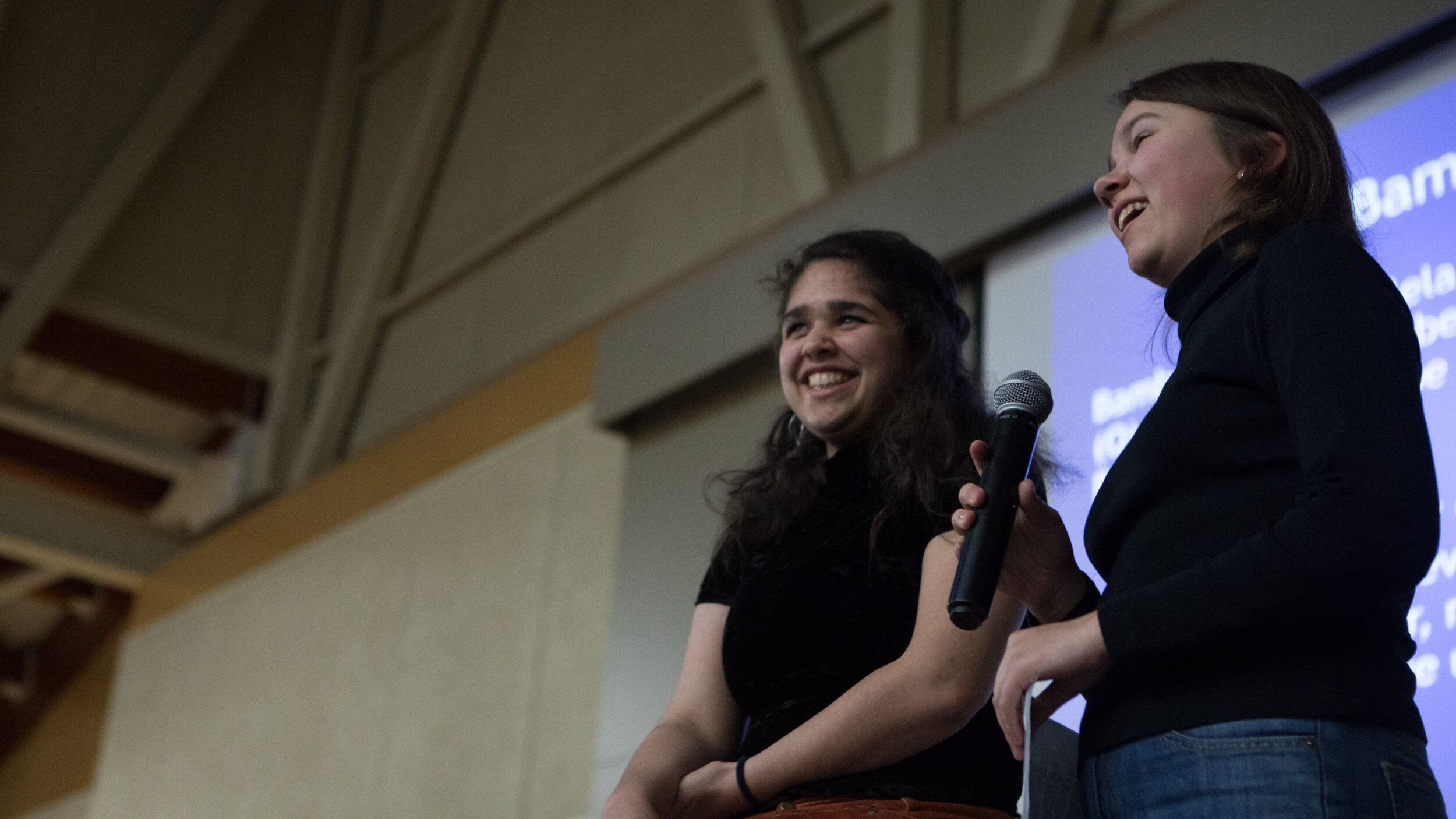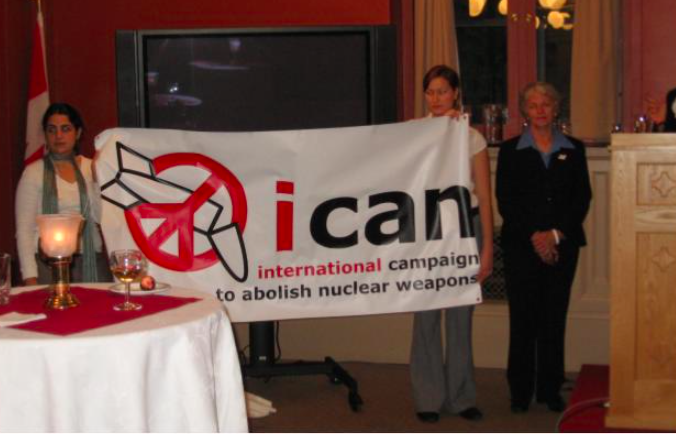
Our mission since 1981 is to build a peaceful world. We are committed to the abolition of nuclear weapons, the prevention of war, the promotion of non-violent means of conflict resolution and social justice in a sustainable world.
CPPNW at the Walk for Peace, 1989 (IMG: Pacific Tribune, 1989)
Our History
We are the Canadian affiliate of International Physicians for the Prevention of Nuclear War (IPPNW).
The global organization, IPPNW, and the Canadian affiliate, Physicians for Social Responsibility were founded in 1980 to bring together physicians from the Soviet Union and the United States to raise the alarm that in the event of a nuclear war, medicine has nothing meaningful to offer.
The organization quickly grew worldwide, was recognized by UNESCO, and in 1985 was awarded the Nobel Peace Prize. Canadian and Soviet doctors participated in exchanges during the Cold War. Physician delegates from the group have met with Prime Ministers, Heads of State, as well as the Pope.
An organization named Canadian Physicians for Research and Education in Peace (C-PREP) was formed as a charitable organization. New charities legislation now allows us to become a single organization. We chose to assume the name: International Physicians for the Prevention of Nuclear War Canada (IPPNWC).
We are a partner organization with the International Campaign to Abolish Nuclear Weapons (ICAN). ICAN was founded by IPPNW in 2007 and won the Nobel Peace Prize in 2017 for its work to bring about the Treaty for the Prohibition of Nuclear Weapons, known as the Ban Treaty.





Timeline
1980
The International Physicians for the Prevention of Nuclear War and its Canadian affiliate, Physicians for Social Responsibility (now IPPNW Canada) were founded.
1981
The IPPNW First Congress was held at Airlie House Virginia, led by Dr. Bernard Lown (USA) and Dr. Evgenie Chazov (USSR). Canadian, Dr. Donald Bates attended the founding meeting.
1982
The name of our organization was changed to Canadian Physicians for Prevention of Nuclear War (CPPNW).
1984
Canada ended its NATO commitment to host US nuclear weapons.
IPPNW was awarded the UNESCO Prize for Peace Education.
1985
IPPNW won the Nobel Peace Prize for bringing American and Soviet physicians together to raise the alarm that nuclear war is the greatest threat to public health in the world.
1986
A delegation of Canadian doctors travelled to Moscow, Leningrad and Tblisi to meet Soviet colleagues and government officials to discuss the threat of nuclear war.
The World Court Project, a global campaign by civil society, succeeded in getting the United Nations General Assembly to request the International Court at the Hague to rule on the legality of nuclear weapons. The ICC opinion stated that nuclear weapons are illegal under international law.
1987
We hosted a delegation of Soviet physicians who travelled across Canada to speak to public meetings and officials about the threat of nuclear war.
Four members of CPPNW were invited to the President Grobachev's “Great Peace Forum for a Nuclear Free World, for the Survival of Humanity”, alongside fellow Canadian Pierre Trudeau. Dr. Ashford was a keynote speaker.
We began organizing annual Hiroshima Day (August 6th) ceremonies across Canada.
At the Seventh World Congress of IPPNW in Moscow, a Japanese delegate distributed origami paper and instructions on how to fold a crane. The audience was engaged—including these two delegates from the Soviet Union—underscoring our common humanity in that moment. (IMG: Charles King, 1987)
1988
Montreal hosted the IPPNW World Congress with 2500 participants and Concert for Peace (Concert pour la Paix) with Crosby, Stills and Nash; Bruce Cockburn; Aquarium (USSR band).
1990
Lanterns for Peace Hiroshima Commemoration, 1990 (IMG: Pacific Tribune, 1990)
1995
Mines Action Canada was founded, a coalition of 20 NGOs to lobby the Canadian Government to take an active role in banning the use of land mines. Our member Celina Tuttle was appointed the coordinator.
1997
Mines Action Canada worked with Canadian Foreign Minister, Lloyd Axworthy on the Ottawa Process that developed and completed the Treaty to Ban Landmines.
1998 & 1999
Dr. Mary-Wynne Ashford led a delegation of IPPNW doctors to North Korea to discuss the dangers of nuclear war.
2000
Dr. Mary-Wynne Ashford represented IPPNW at Nobel Peace Laureates Summit hosted by the Gorbachev Foundation in Rome.
Dr. Ashford, Past President President of IPPNW meeting with Pope John Paul II, 2000
2007
IPPNW founded the International Campaign to Abolish Nuclear Weapons (ICAN), a coalition of civil society organizations working towards the goal of a ’Nuclear Weapons Convention’, nicknamed a ’Nuclear Weapons Ban Treaty’
ICAN was “launched” on Parliament Hill. This event, was co-sponsored internationally by Parliamentarians for Nuclear Non-proliferation and Disarmament, represented by its co-chair Alexa McDonough OC. Setsuko Thurlow, a Hiroshima bomb survivor made an impassioned speech. Attendees from all political parties attended.
The ICAN banner is unfurled at the launch event on Parliament Hill in 2007. Two medical students hold the banner with Alexa McDonough on the right.
2006 - 2017
ICAN was promoted, thus helping to change the old rhetoric of “nuclear deterrence” to the language of the “humanitarian effects” of nuclear weapons. The goal of creating a treaty to make nuclear weapons illegal was made public.
Using the grass-roots strength of ICAN, individual ICAN supporters were solicited and lists kept. Celebrity endorsers were sought out. Some of the more prominent celebrities included Bruce Cockburn, John Polanyi, Joel Plaskett, Naomi Klein.
Three international conferences on the Humanitarian Effects of Nuclear Weapons were held, but Canada chose to not send an official diplomat to any of them.
2017
The General Assembly of the UN finalized the Treaty on the Prohibition of Nuclear Weapons (TPNW). It was initially adopted by 122 nations, but not by Canada or any of the NATO countries
ICAN was awarded the Nobel Peace Prize for its efforts in creating the Treaty on the Prohibition of Nuclear Weapons. Setsuko Thurlow was the co-recipient of this prize. Simultaneous with the actual Nobel Prize ceremony in Oslo, an event on Parliament Hill was held to honour Setsuko and ICAN. Members from all political parties attended despite the fact that Canada had not participated officially in the process of attaining the TPNW.
2019
Dr. Jonathan Down & Dr. Mary-Wynne Ashford were presented with awards from the Canadians for a Nuclear Weapons Convention, a group of 1,034 recipients of the Order of Canada. The awards recognize their efforts in 2018 to speaking with several thousand students and community representatives about the on-going threat of nuclear war.
2020
The Bulletin of the Atomic Scientists moved the Doomsday Clock to 100 seconds to midnight, identifying an unprecedented risk to human survival from both climate change and nuclear war.
Our Board of Directors
IPPNWC is incredibly lucky to have an amazing team of board members. For the 2023/2024 year, these board members include:
Dr. John Guilfoyle (President)
Dr. Charles King
Dr. Jonathan Down
Maureen Brower
Dr. Nancy Covington
Dr. Erica Frank
Dr. Tim Takaro
Dr. Huguette Hayden
Marney Cuff-Eisenbarth
Avinashpall Singh





